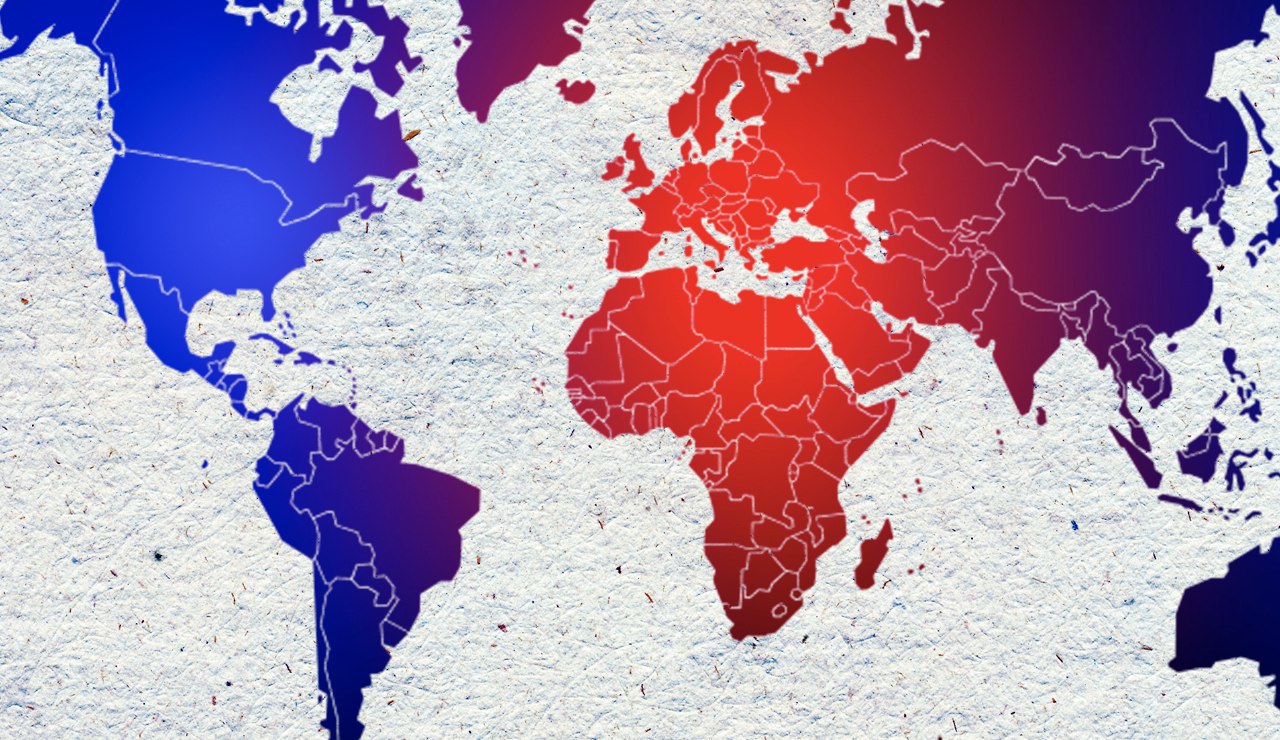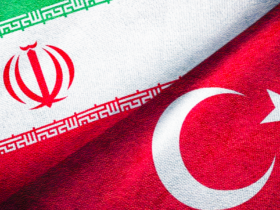The US is regressing as a geopolitical powerhouse. The country is facing its most difficult days in recent history, with the 2020 elections looming. The US economy has shrunk by 34% in the second quarter of this year due to the COVID-19 and some other factors: an all-time record. A wave of riots triggered by the murder of black American George Floyd in Minneapolis at the hands of the police May 25 has revealed the strong polarization and the state’s failure in crisis management in the country.
THE US IS UNABLE GOVERN ITSELF, YET IS TEARING OTHER COUNTRIES APART
The United States was unable to manage the COVID-19 crisis, nor the aftermath of Floyd’s murder. The polarization has grown so high in the struggle of the election campaign that the political parties involved don’t seem to mind weakening the United States in order to win. This is quite hard to believe for a nation that spends $82 billion on intelligence each year. The inevitable end is at hand for the United States, and global hegemony is about to change hands. A multipolar world order has already emerged. The US is in a very weak position during this transition period, yet, its oceanic geography, its global military bases network, its nuclear and conventional military capabilities, superior military industry, and the ideology of the American Dream (or the Atlantic opium), continues shaping the environment of this transition period. The US is acting increasingly destructive as it falls from power.
THE RIMLAND COLLAPSES
There is no doubt that the main element they hope to preserve is the Rimland. This is the structure preventing Russia (and China later on) from expanding into the oceans, by trapping it into the Heartland of the Eurasian geography. China, which has been catching up to the United States since the 1970s, is now one of the main targets of the Rimland strategy. In the end, the expansion of the Eurasian camp, which has grown stronger with the cooperation of Russia and China, taking some EU countries and Turkey into its sphere of influence, is a nightmare for the United States. The struggle is still going full steam. The United States, an ally of the Soviet Union during World War II, shortly after considered using nuclear weapons on the USSR -even though Moscow did not possess nuclear weapons at the time- just to prevent their becoming a strategic rival to the US interests in Europe. Today, the US continues to try everything to weaken and break Chinese and Russian influence in Europe.
THE MAIN TARGETS: RUSSIA AND CHINA
Russia is the biggest target in the military and energy areas in this geopolitical tug of war. The US, for the time being, is not able to challenge Russian weapons and technology in certain areas like hypersonic and nuclear weapons. China is the target in the political and the economic areas. Although they are not as threatening as Russia militarily, China holds the ability to prevent the freedom of movement of the United States in the West Pacific Region. The United States is using NATO to break the Russian military effectiveness, and is putting enormous pressure upon those European countries who are shifting towards Russia, and especially upon Turkey.
THE UNITED STATES KEEPS ITS INFLUENCE IN TURKEY
Although every survey conducted in Turkey suggests the US Government is perceived as not friendly by some 70% of the population, the United States continues to heavily influence Turkey. American pressure, which continues to be effective psychologically, and is placed via currency operations, international law and the threats of sanctions/embargoes. The FETO terrorist organization, which is still secretly effective, Atlantic-affiliated individuals/institutions and the media still cause Turkey to hesitate in Syria, Libya and in the Eastern Mediterranean. The Turkish government still cannot openly admit this threat and take a proper attitude against it. Although the United States has engaged in an anti-Turkish activities with Greece and Greek Cyprus almost to the level of forming an official alliance, some high-ranking government officials still talk about an alliance and a cooperation with the United States in Libya.
THE US GOVERNMENT AND TURKOPHOBIA
The enmity toward Turkey runs so deeply, that the US Secretary of State immediately called and congratulated his Egyptian counterpart after the signing of the Greek-Egyptian EEZ delimitation agreement on August 6. Pompeo is not afraid to show that he was one of the masterminds behind this deal. The United States’ goal is to set traps to alter Mediterranean geopolitics, to teach Turkey a lesson and to create a situation unfavorable to Turkey in the Eastern Mediterranean, Cyprus, Libya and in Syria. Similarly, the US will likely sign an oil contract with the PKK’s sub-branch, the SDF, in the north of Syria and build-up militarily in the Greek port City of Alexandropoulos, in spite of the international agreements forbidding such actions. Unfortunately, despite all these incidents, a pro-American still has a hold in Turkey.
THE UNITED STATES IS THREATENING GERMANY
Germany has been put under particular pressure as of late. Even though it holds the political and economic leadership of the EU, Germany continues to pay for the atrocities of World War II to this day. Germany is in some ways treated as though it were a 51st state of the United States. Last week, three American senators threatened the operators of the Sassnitz ferry port in Mecklenburg-West Pomerania with “destructive” sanctions if they continue to participate in the construction of the NordStream-2 Baltic Sea pipeline, which is planned to distribute Russian natural gas to Germany under the sea. In a letter on August 5, they stated: “If you knowingly continue to provide goods, services and support for the NordStream-2 project, you will actually devastate your company’s future in terms of financial assets.” Of interest, this port also serves as a hub for the Northern European sub-branch of the Chinese BRI (Belt and Road Initiative), while ensuring the energy and the logistical security of Northern Europe. Let us also point out that this is the only port capable of working in logistical integration with Russia. The owner of this port is actually the German Government with 90% of the assets belonging to the City Government of Sassnitz and 10% belongs to the State Government of Mecklenburg-Vorpommern.
In short, American senators feel empowered to threaten a state-owned company in Germany like a cowboy entering a saloon in the Wild West. Of course, this strengthens the anti-American sentiment in Germany, especially among the left-wing parties, yet somehow does not trigger a strong and harsh anti-American resistance across the nation.
This resembles somewhat what happened at the end of the First World War. On November 11, 1918, Germany surrendered to Britain and its allies, however, on the morning of October 22, two weeks before the surrender, the Imperial German Navy was planning to sail to the North Sea and attack the Royal Navy. But when a communist uprising took place among the Navy and in the northern territories, the Kaiser had to flee the country, and was unable to plan any new attack. When the uprising was suppressed, a ceasefire was signed and the 33 vessels and 90,000 personnel of the once strong Imperial German Navy surrendered at the British port of Flirt of Forth. Today, Germany continues to make some zigzags to prevent the EU from falling apart, and despite its extremely strong elements of national power, submits to US oppression. Those who do not submit are harshly punished.
The United States sees itself as the hand of god and the Roman Empire of the 21st century when it comes to Germany.
CHINA-RUSSIA RAPPROCHEMENT AND STABILITY
China and Russia pay the price for resistance to the American aggression through trade wars, embargoes, restrictions and sanctions. While I write these words, the United States has decided to sanction Hong Kong’s Chinese administrators for ‘disturbing democracy’. At the end of June, the United States, who sent three aircraft carrier groups to the South China Sea, something never before seen in history, is increasing its joint and collective exercises in the Pacific, whilst making think tanks like RAND write scenarios of a possible war with China. They also do not lag behind in terms of usage of the soft power. In June, the Inter Parliamentary Alliance on China (IPAC) was established.
The alliance includes Japan, Canada, Australia, Britain, Germany, Norway and Sweden, and it will administer the actions against China and its government under the leadership of the US. The structure is founded on the values of democracy, human rights and neoliberalism. In a way similar to the McCarthy period, it sees China as a threat to the western values, but is actually just a new instrument of a major geopolitical struggle. This way, prevention of a unification and solidarity in Eurasia and the convergence of the Chinese economic power with Russian military power is being targeted.
But they are too late. Russia has overcome the ever-growing hostile attitude of the West since the Annexation of Crimea and by avoiding rivalry with China in Eurasia. Their solidarity provides hope for all humanity. According to the Russian strategist Karaganov, even though there are many cultural differences between these two nations, both of them were culturally influenced by the Turks. The fact that they both lived under the rule of the Mongol Empire up to the 15th century has resulted in their having some common historical values. Today, the Russian-Chinese alliance is the world’s sole guarantee against the American aggression. The situation maintained by the relations between China and Russia in Asia and with China’s BRI (Belt and Road Initiative), has revealed the potential of China’s leadership, or at very least, its position as first among equals (Primus inter-pares) in the heartland of Eurasia.
Of course, we must mention India as well. We have to stress that the Russian influence over India, a country which is still critical in the global balance of power, comes before American influence. Today, if India is a nuclear power under the sea, it is thanks to Russia.
EURASIAN RAPPROCHEMENT
There are countries in Europe where rapprochements such as that between Germany and Russia have opened up possibilities for collaboration with China as well. China’s economic relations of 16+1 are very interesting, even though Italy and Central/Eastern European countries are the members of NATO and the EU. We do not know how many of these nations could resign under the pressure from the US, but we can say that at least some of these countries will be shifted towards the Eurasian axis as the United States weakens. Today, the United States is not in a position to maintain global stability. At the same time, there is nothing holding back rapid Chinese economic growth and its success.
Thus, the US will continue to usher in chaos around the world in order to protect its hegemonic position. The stabilizing role of Russia between Europe and China and the shift of some southern European countries, including Turkey, towards Eurasia will make the shift to a new balance of geopolitical power inevitable, eventually making the Rimland strategy completely untenable.
THE SITUATION IS CRITICAL
Turkey is besieged around the Eastern Mediterranean. This siege reached its peak with the threats of economic embargoes, sanctioning and the foreign currency operations. The period of staggering against the American and European open hostility towards Turkey after the purchase of the S-400s, the TurkStream project, and our policies in the Eastern Mediterranean, must come to an end. We are faced with extraordinary conditions. All kinds of destructive and provocative scenarios which the United States has induced in line with its strategy of creative chaos will be attempted in order to pull Turkey back to the American axis and toward the alliances of the Cold War. Although the Rimland theory has all but collapsed, the United States will continue to give Greece, Egypt, and the Greek Cypriots, supporting roles in similar scenarios and strategies.
Unfortunately, the conditions for a conflict in the Eastern Mediterranean are ripe today. The Soros-affiliated Armenian Government has already provoked conflict between Azerbaijan and Armenia. Haftar’s forces have been piling up since the early-July in Libya. American support for the sub-branch of the PKK in Syria, the YPG/SDF, and the puppet structure of Barzanistan in Iraq, keeps on flowing. Imperialism has succeeded in crumbling the home front with the foreign currency operations, made worse by the government’s polarizing policies, as well as the opposition’s silence on these anti-Ataturk implementations and their destructive/separatist stances. What happened 100 years ago is no different than what is happening today in Turkey.
Back then, there was the Caucasian Barrier and the pro-mandate groups; today, there is a Mediterranean Barrier and the same pro-mandate groups. Mustafa Kemal shattered that barrier and saved our 1,000-year-old homeland, thanks to the Turkish-Soviet alliance he established with Lenin. Today, Turkey can destroy the US/EU Mediterranean barrier with an alliance with Azerbaijan, TRNC, and Russia.
Today, Russian geopolitical interests converge with Turkish interests. As was the case 100 years ago, Russia faces embargoes, sanctions, and the siege of imperialism.
Imperialism is again trying to make Turkey and Russia hostile to each other in its own interests. These two countries need to cooperate rationally, without falling for the trap of the powerful Atlanticist camps. Lack of decisiveness might stall for time, but Imperialism would not give up. The establishment of the new world order in the collapsing Rimlands can only be accelerated under Turkish leadership.
In this regard, Turkey should abandon its religion-based, Ikhwan-oriented foreign policies and shift towards a defensive foreign policy with Mustafa Kemal’s realistic principles, with the Blue Homeland in its center, and a foreign policy that seeks cooperation with Russia and China. We can only take our ship out of dire straits to the high seas in the 21st Century by avoiding falling victim to the Atlanticist camp’s furious and destructive geopolitical ambitions; and by seeing beyond the Clash of Civilizations proposed by the provocative strategist Huntington. It is time to learn from history, geopolitics, and the science of strategy. It is time to hold on tightly to Ataturk’s principles. It is time to remember the great values of Turkishness. It is time to say, “They will leave, as they have come”. It is time to unite.

















Leave a Reply